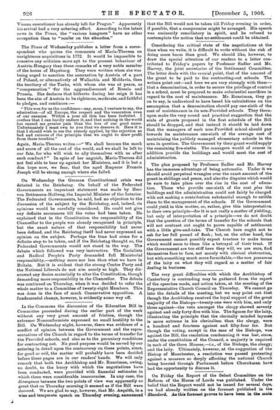The very great difficulties with which the Archbishop of Canterbury
is contending may be gathered from the report of the speeches made, and action taken, at the meeting of the Representative Church Council on Thursday. We cannot go into the details of the meeting, but we may point out that though the Archbishop received the loyal support of the great majority of the Bishops—twenty-one were with him, and only three against—the vote amongst the clergy showed seventy against and only forty-five with him. The figures for the laity, illustrating the principle that the clerically minded layman is more extreme in his clericalism than the clergy, were a hundred and fourteen against and fifty-four for. But though the voting, except in the case of the Bishops, was against the Bill, the resolution condemning it was lost, since, under the constitution of the Council, a majority is required in each of the three Houses,—i.e., of the Bishops, the clergy, and the laity. Ultimately, however, -at the suggestion of the Bishop of Manchester, a resolution was passed protesting against a measure so deeply affecting the national Church being hurried through Parliament before Churchmen have had the opportunity to discuss it.






































































 Previous page
Previous page